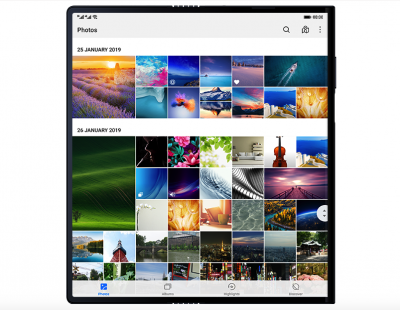Huawei announced its first foldable smartphone the Huawei Mate X around the same time Samsung announced the Galaxy Fold in February last year. And while the Samsung Galaxy Fold faced some initial hiccups due to the early review units being too fragile, forcing Samsung to push the Galaxy Fold's official release to September 2019, Huawei didn't have any such issues.
But the Chinese multinational technology company preferred not to launch the Mate X until November, stating that it used the time between the announcement and release to get feedback and make further improvements before the phone went on sale.
Now, just days after Samsung CEO DJ Koh announced at CES 2020 that the company sold between 400,000 to 500,000 Galaxy Folds since launch on 6 September 2019, Huawei has come out with the estimates for its Mate X. The Chinese tech giant claims it is selling close to 100,000 units of the Mate X per month since launch in China in November.
A great feat for Huawei


That's a pretty good number for Huawei, considering the Mate X is only for sale in China. The foldable smartphone which employs a slightly different folding technique from the Galaxy Fold --folding outward as opposed to inward on the Galaxy Fold -- sells for CNY 16,999 or roughly $2,400 and S$ 3,300.
Huawei Mate X sales estimate is also just shy of the estimates of rival Samsung Galaxy Fold, which as mentioned earlier, sold around 400,000 to 500,000 units since launch in September. If we could recall, a top Samsung executive had earlier incorrectly claimed that the Galaxy Fold had sold 1 million units since launch, but Samsung denied the incorrect claim and gave a more realistic number at the recently concluded CES 2020.
Huawei is thriving despite US ban
If Huawei's estimates turn out to be true, it would mean that Huawei has managed to sell at least 200,000 to 250,000 Mate X units since it's launch in November last year, which by the way, isn't bad at all considering the phone's limited availability (available only in China) and the fact that Huawei is in the middle of an ongoing legal battle in the US.
The company is restricted from selling its products in the US since early last year after the US Department of defence found Huawei guilty of spying on the country. The US government has even asked Google to stop providing its Google Mobile Services (GMS) support to Huawei devices. GMS included popular Google apps such as YouTube, Gmail, Google Maps and even Google's application download platform Google Play Store.
Huawei is still strong in Asian markets, but future looks uncertain
However, despite all these limitations and roadblocks, Huawei still seems to be doing quite well in the Asian market, especially in its home country China. Although the fear of a difficult future and struggle for survival amidst these difficult times lingers over the company's head. We hope, the company continues to innovate as it has been doing and sells more units, keeping the goodwill of the consumer in mind.









